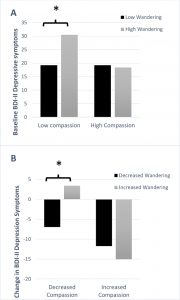Help Withdraw from Antidepressant Drugs with Mindfulness
By John M. de Castro, Ph.D.
“mindfulness can help you deal with emotional symptoms of SSRI withdrawal. Techniques such as meditation and deep breathing can help you reduce levels of irritability by reminding you to slow down and step back from a situation before you react.” – Sarah Fader
Clinically diagnosed depression is the most common mental illness, affecting over 6% of the population. Major depression can be quite debilitating. It is also generally episodic, coming and going. Some people only have a single episode but most have multiple reoccurrences of depression. Depression can be difficult to treat. It is usually treated with antidepressant medication. But, of patients treated initially with drugs only about a third attained remission of the depression. After repeated and varied treatments including drugs, therapy, exercise etc. only about two thirds of patients attained remission. But drugs often have troubling side effects and can lose effectiveness over time.
It seems reasonable to use antidepressant drugs initially in the treatment of depression but then withdraw the drugs. But withdrawal effects can occur. Symptoms of antidepressant withdrawal are anxiety, insomnia or vivid dreams, headaches, dizziness, tiredness, irritability, flu-like symptoms, including achy muscles and chills, nausea, electric shock sensations, return of depression symptoms. Clearly, there is a need for treatment alternatives that can be effective alone or in combination with drugs. And can help with antidepressant withdrawal.
Mindfulness-Based Cognitive Therapy (MBCT) was specifically developed to treat depression. MBCT involves mindfulness training, containing sitting, walking and body scan meditations, and cognitive therapy that attempts to teach patients to distinguish between thoughts, emotions, physical sensations, and behaviors, and to recognize irrational thinking styles and how they affect behavior. MBCT has been found to be effective in treating depression. Hence, there is a need to study the application of MBCT to assist in the withdrawal of antidepressant medication.
In today’s Research News article “Managing Antidepressant Discontinuation: A Systematic Review.” (See summary below or view the full text of the study at: https://www.ncbi.nlm.nih.gov/pmc/articles/PMC6342590/), Maund and colleagues review and summarize the published research studies of the effectiveness of various therapies including Mindfulness-Based Cognitive Therapy (MBCT) to assist in the withdrawal of patients from antidepressants. They found 15 published randomized controlled trials with 3 employing MBCT.
They report that the randomized controlled trials found that tapering off antidepressant drugs was far more successful than abrupt withdrawal and that psychological therapies significantly assisted in the success of the process, with successful cessation rates of 40% to 95% compared to 6% to 7% when the physician sent a letter recommending withdrawal. Mindfulness-Based Cognitive Therapy (MBCT) was found to have successful cessation rates of 55% to 75%. MBCT also did not increase relapse/recurrence rates with 44% to 48% relapse.
There were only three randomized controlled trials that employed Mindfulness-Based Cognitive Therapy (MBCT) to aid in antidepressant withdrawal and there were no studies that included discontinuation symptoms. So, conclusions must be tempered and measured. But the published research suggests that MBCT is is safe and effective in improving the likelihood of successful withdrawal from antidepressants without increasing the likelihood of relapse.
So, help withdraw from antidepressant drugs with mindfulness.
“Psychiatric medication is designed to alleviate suffering. Mindfulness can function in this way too. However, psychiatric medication is not generally designed to promote flourishing. . . . Mindfulness can alleviate distress, but it can also lead us states of flourishing and a sense of the deep completeness of the moment.” – Matthew Brensilver
CMCS – Center for Mindfulness and Contemplative Studies
This and other Contemplative Studies posts are also available on Google+ https://plus.google.com/106784388191201299496/posts and on Twitter @MindfulResearch
Study Summary
Maund, E., Stuart, B., Moore, M., Dowrick, C., Geraghty, A., Dawson, S., & Kendrick, T. (2019). Managing Antidepressant Discontinuation: A Systematic Review. Annals of family medicine, 17(1), 52–60. doi:10.1370/afm.2336
Abstract
PURPOSE
We aimed to determine the effectiveness of interventions to manage antidepressant discontinuation, and the outcomes for patients.
METHODS
We conducted a systematic review with narrative synthesis and meta-analysis of studies published to March 2017. Studies were eligible for inclusion if they were randomized controlled trials, quasi-experimental studies, or observational studies assessing interventions to facilitate discontinuation of antidepressants for depression in adults. Our primary outcomes were antidepressant discontinuation and discontinuation symptoms. Secondary outcomes were relapse/recurrence; quality of life; antidepressant reduction; and sexual, social, and occupational function.
RESULTS
Of 15 included studies, 12 studies (8 randomized controlled trials, 2 single-arm trials, 2 retrospective cohort studies) were included in the synthesis. None were rated as having high risk for selection or detection bias. Two studies prompting primary care clinician discontinuation with antidepressant tapering guidance found 6% and 7% of patients discontinued, vs 8% for usual care. Six studies of psychological or psychiatric treatment plus tapering reported cessation rates of 40% to 95%. Two studies reported a higher risk of discontinuation symptoms with abrupt termination. At 2 years, risk of relapse/recurrence was lower with cognitive behavioral therapy plus taper vs clinical management plus taper (15% to 25% vs 35% to 80%: risk ratio = 0.34; 95% CI, 0.18–0.67; 2 studies). Relapse/recurrence rates were similar for mindfulness-based cognitive therapy with tapering and maintenance antidepressants (44% to 48% vs 47% to 60%; 2 studies).
CONCLUSIONS
Cognitive behavioral therapy or mindfulness-based cognitive therapy can help patients discontinue antidepressants without increasing the risk of relapse/recurrence, but are resource intensive. More scalable interventions incorporating psychological support are needed.
https://www.ncbi.nlm.nih.gov/pmc/articles/PMC6342590/









